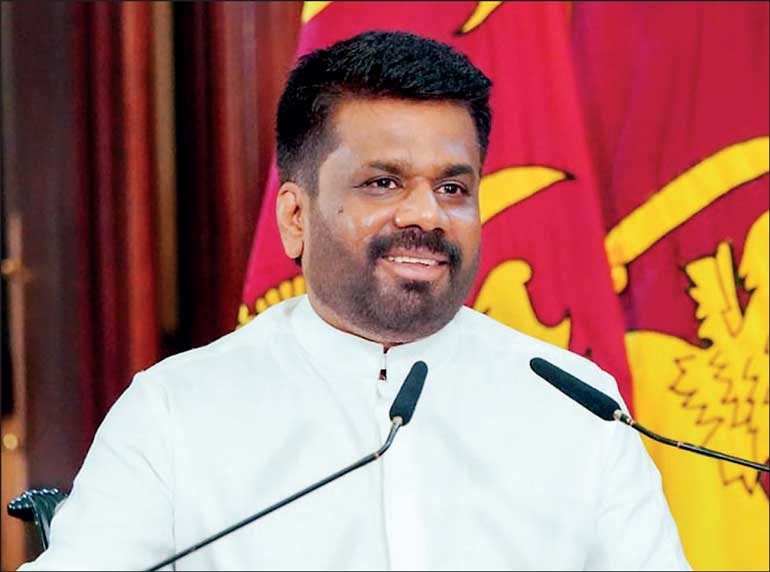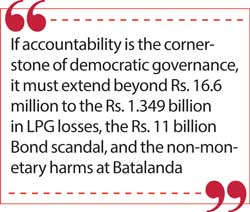Sunday Feb 22, 2026
Sunday Feb 22, 2026
Wednesday, 15 October 2025 00:26 - - {{hitsCtrl.values.hits}}

A year later, the Government’s rhythm remains, yet its melody has dulled
 One year on, the moral march of Anura Kumara Disanayake’s Government echoes Jonathan Chait’s warning: movements that mistake conviction for wisdom risk becoming moral parades rather than governing forces [1].
One year on, the moral march of Anura Kumara Disanayake’s Government echoes Jonathan Chait’s warning: movements that mistake conviction for wisdom risk becoming moral parades rather than governing forces [1].
1. The promise of the march
“The ants go marching one by one, hurrah, hurrah… The little one stops to tie his shoe…” Adapted from an old folk rhyme, the song endures because its rhythm carries a warning: unity preserves survival, but unthinking motion breeds futility.
When Anura Kumara Disanayake (AKD) and the National People’s Power (NPP) took office, their campaign sounded like that hopeful parade of ants escaping a storm. They promised to rebuild the rule of law, purge corruption, and restore national dignity. To weary citizens, the rhythm of their march felt redemptive — an orderly exit from chaos.
2. The drift — motion without meaning
A year later, the Government’s rhythm remains, yet its melody has dulled. Discipline endures, but direction has faded.
3. The container affair — when the march turned blind
In early 2025, media reports revealed that over 300 containers left the Colombo Port without inspection. The DGC later stated that the release order followed joint advice from President Disanayake and Ports Minister Bimal Ratnayake [2]. Whether or not the cargo contained illicit goods, the breach was serious: executive direction overriding institutional autonomy — the opposite of the NPP’s pledge of transparency.
4. The Chait Lens — From Washington to Colombo
Jonathan Chait’s analysis of post-defeat paralysis in the US Democratic Party illuminates the NPP’s post-victory drift [1].
5. Lessons from the ants and the democrats
6. Fault lines after one year
 Each is another verse in a song that now sounds mechanical.
Each is another verse in a song that now sounds mechanical.
7. Integrity and the Burkina Faso contrast
At the 80th UN session, AKD presented himself as leading a crusade against corruption. Yet beside Captain Ibrahim Traoré of Burkina Faso — who spoke of dignity, independence, and self-sacrifice — AKD’s speech sounded managerial rather than moral; calculated, not courageous.
8. Selective accountability — the Ranil test
AKD pledged to “bring the culprits under the law.” Yet his most visible action against Ranil Wickremesinghe concerns a mere Rs. 16.6 million travel-fund case, while far larger scandals remain untouched:
If accountability is the cornerstone of democratic governance, it must extend beyond Rs. 16.6 million to the Rs. 1.349 billion in LPG losses, the Rs. 11 billion Bond scandal, and the non-monetary harms at Batalanda.
9. Duty-free permits (2015) — a rule of law test
AKD pledged equal standards under the law. Yet the 2015–2016 duty-free vehicle-permit episode remains unresolved.
Test of consistency: If the Government is serious, it should publish the full permit list, quantify losses, recover unlawful gains, and legislate a permanent ban in favour of a transparent pooled vehicle fleet for MPs.
10. The moral of the march
Unity without thought becomes obedience. Order without reflection breeds decay. The “little one” who stops to tie his shoe symbolises conscience in action — a pause that preserves direction. If rulers will not pause, citizens eventually will.
11. Conclusion — from parade to governance
After one year, the challenge is not rhythm but purpose. To restore the rule of law, symbolic prosecutions will not suffice. Genuine reform requires equal standards across the largest wounds: Batalanda, the Bond scandal, LPG procurement, and duty-free permits.
These are not partisan demands but constitutional ones. Only by embodying the restraint it asks of citizens can the administration reclaim moral authority — and help Sri Lanka recover the republic it was promised.
Footnotes:
[1] Jonathan Chait, “Democrats Still Have No Idea What Went Wrong,” The Atlantic, 6 Oct 2025.
[2] Darmasiri Kariyawasam, “YouTube media briefing on Customs container release,” https://www.youtube.com/watch?v=HKn49fTDzW8
[3] Auditor General, Special Report on LPG Procurement (2022–2023).
[4] Commission of Inquiry into the Central Bank Bond Issue (2015).
[5] Report of the Batalanda Commission of Inquiry (1998).
[6] Election Commission financial disclosures — copies held by the author.
[7] Contemporaneous parliamentary statements and investigative reporting on 2015–2016 duty-free permits (valuation, resale, and legal-basis debates).
(The writer is a political economist and columnist who writes on law, governance, and moral psychology. A former lecturer at the University of Peradeniya, he has published extensively in the Daily FT and continues to examine Sri Lanka’s evolving political and institutional landscape through analytical and interdisciplinary lenses.)